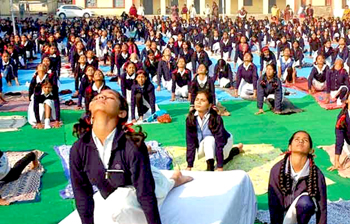New Delhi, Apr 25: Neighbourhood and standalone shops, including those selling garments, mobile phones, hardware and stationery items have been allowed to open but those located in market places, malls and COVID-19 hotspots and containment zones, will continue to remain shut till May 3.
In rural areas, all shops, except those in single and multi-brand shopping malls, are allowed to open.
However, a Home Ministry official said the final decision of whether to allow the additional shops to open or not will be taken by the state governments and Union Territory administrations depending on their respective COVID-19 situation.
While allowing opening of more shops, a move seen as a relief to people who have been under lockdown since March 24, the government order issued on Friday night said the shops will be functioning with 50 per cent of workforce and after adhering strictly to precautions which include social distancing and wearing of masks.
The Union Home Ministry also said malls, liquor and cigarette shops, sale of non-essential items through e-commerce platforms continue to remain shut.
Restaurants, hair salons and barber shops will not be allowed to open as these render services and do not fall under the shop category.
Amending its April 15 order, Union Home Secretary Ajay Bhalla said in the Friday night order that "all shops, including neighbourhood shops and standalone shops, shops in residential complexes, within the limits of municipal corporations and municipalities, registered under the the Shops and Establishment Act of the respective State and UT" will be allowed to open during the lockdown.
The ministry also said shops located in registered markets located outside the municipal corporations and municipalities can open after following the drill of social distancing and wearing of masks but with 50 per cent of strength.
However, single and multi-brands shall continue to remain closed in these areas also.
"All shops registered under the the Shops and Establishment Act of the respective State/UT, including shops in residential complexes and market complexes, except shops in multi-brand and single brand malls, outside the limits of municipal corporations and municipalities, with 50 per cent strength of workers with wearing of masks and social distancing being mandatory" will be allowed to function, the order said.
In a statement on Saturday, the Home Ministry said the order implies that in rural areas, all shops, except those in shopping malls are allowed to open.
In urban areas, all standalone shops, neighbourhood shops and shops in residential complexes are allowed to open.
Shops in markets and market complexes and shopping malls are not allowed to open.
"It is clarified that sale by e-commerce companies will continue to be permitted for essential goods only," the order said and also added that sale of liquor and other items continues to be prohibited as specified in the national directives for COVID-19 management.
The ministry said that liquor shops were given licence under the Excise Act of the states and the establishments thrown open from Saturday were covered under the Shops and Establishment Act of the states.
Sale of cigarettes, gutka are continue to be prohibited during the lockdown.
"As specified in the consolidated revised guidelines, these shops will not be permitted to open in areas, whether rural or urban, which are declared as containment zones by respective States and Union Territories," the statement said.
The lockdown was first announced by Prime Minister Narendra Modi on March 24 in a bid to combat the coronavirus pandemic. It was further extended till May 3.
 We have decided to constitute a committee of our members headed by Maulana Wali Rahmani and launch a country-wide campaign against the move of making 'Surya Namaskar' and Yoga compulsory in schools, AIMPLB member Maulana Khalid Rashid Farangi Mahali said.
We have decided to constitute a committee of our members headed by Maulana Wali Rahmani and launch a country-wide campaign against the move of making 'Surya Namaskar' and Yoga compulsory in schools, AIMPLB member Maulana Khalid Rashid Farangi Mahali said.




Comments
Add new comment